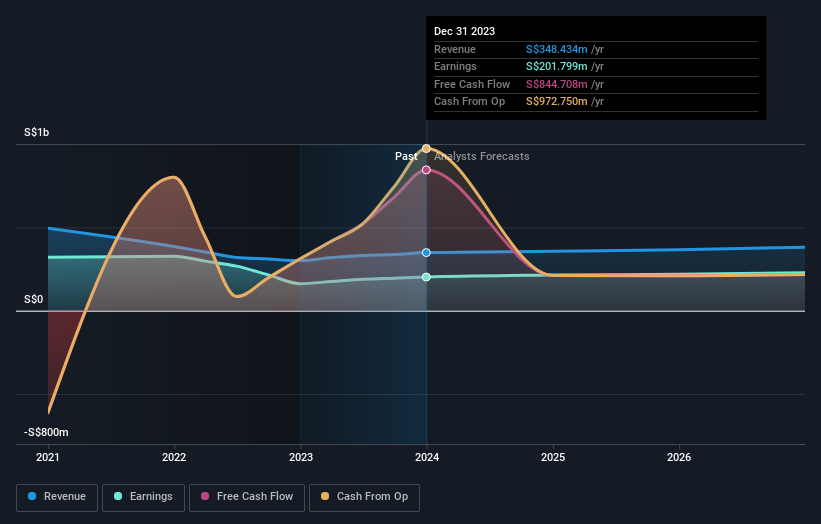Private companies own 40% of Yangzijiang Financial Holding Ltd. (SGX:YF8) shares but retail investors control 47% of the company
Key Insights
The considerable ownership by retail investors in Yangzijiang Financial Holding indicates that they collectively have a greater say in management and business strategy
50% of the business is held by the top 8 shareholders
Ownership research, combined with past performance data can help provide a good understanding of opportunities in a stock
Every investor in Yangzijiang Financial Holding Ltd. (SGX:YF8) should be aware of the most powerful shareholder groups. And the group that holds the biggest piece of the pie are retail investors with 47% ownership. In other words, the group stands to gain the most (or lose the most) from their investment into the company.
Private companies, on the other hand, account for 40% of the company's stockholders.
In the chart below, we zoom in on the different ownership groups of Yangzijiang Financial Holding.
Check out our latest analysis for Yangzijiang Financial Holding
What Does The Institutional Ownership Tell Us About Yangzijiang Financial Holding?
Institutional investors commonly compare their own returns to the returns of a commonly followed index. So they generally do consider buying larger companies that are included in the relevant benchmark index.
Yangzijiang Financial Holding already has institutions on the share registry. Indeed, they own a respectable stake in the company. This can indicate that the company has a certain degree of credibility in the investment community. However, it is best to be wary of relying on the supposed validation that comes with institutional investors. They too, get it wrong sometimes. When multiple institutions own a stock, there's always a risk that they are in a 'crowded trade'. When such a trade goes wrong, multiple parties may compete to sell stock fast. This risk is higher in a company without a history of growth. You can see Yangzijiang Financial Holding's historic earnings and revenue below, but keep in mind there's always more to the story.
Yangzijiang Financial Holding is not owned by hedge funds. YZJ Settlement Julius Baer Trust Company is currently the company's largest shareholder with 24% of shares outstanding. For context, the second largest shareholder holds about 11% of the shares outstanding, followed by an ownership of 4.7% by the third-largest shareholder. Yuanlin Ren, who is the third-largest shareholder, also happens to hold the title of Chairman of the Board.
We also observed that the top 8 shareholders account for more than half of the share register, with a few smaller shareholders to balance the interests of the larger ones to a certain extent.
While it makes sense to study institutional ownership data for a company, it also makes sense to study analyst sentiments to know which way the wind is blowing. There is a little analyst coverage of the stock, but not much. So there is room for it to gain more coverage.
Insider Ownership Of Yangzijiang Financial Holding
The definition of an insider can differ slightly between different countries, but members of the board of directors always count. Management ultimately answers to the board. However, it is not uncommon for managers to be executive board members, especially if they are a founder or the CEO.
Most consider insider ownership a positive because it can indicate the board is well aligned with other shareholders. However, on some occasions too much power is concentrated within this group.
Shareholders would probably be interested to learn that insiders own shares in Yangzijiang Financial Holding Ltd.. As individuals, the insiders collectively own S$66m worth of the S$1.2b company. Some would say this shows alignment of interests between shareholders and the board. But it might be worth checking if those insiders have been selling.
General Public Ownership
With a 47% ownership, the general public, mostly comprising of individual investors, have some degree of sway over Yangzijiang Financial Holding. This size of ownership, while considerable, may not be enough to change company policy if the decision is not in sync with other large shareholders.
Private Company Ownership
It seems that Private Companies own 40%, of the Yangzijiang Financial Holding stock. Private companies may be related parties. Sometimes insiders have an interest in a public company through a holding in a private company, rather than in their own capacity as an individual. While it's hard to draw any broad stroke conclusions, it is worth noting as an area for further research.
Next Steps:
It's always worth thinking about the different groups who own shares in a company. But to understand Yangzijiang Financial Holding better, we need to consider many other factors. For example, we've discovered 1 warning sign for Yangzijiang Financial Holding that you should be aware of before investing here.
Ultimately the future is most important. You can access this free report on analyst forecasts for the company.
NB: Figures in this article are calculated using data from the last twelve months, which refer to the 12-month period ending on the last date of the month the financial statement is dated. This may not be consistent with full year annual report figures.
Have feedback on this article? Concerned about the content? Get in touch with us directly. Alternatively, email editorial-team (at) simplywallst.com.
This article by Simply Wall St is general in nature. We provide commentary based on historical data and analyst forecasts only using an unbiased methodology and our articles are not intended to be financial advice. It does not constitute a recommendation to buy or sell any stock, and does not take account of your objectives, or your financial situation. We aim to bring you long-term focused analysis driven by fundamental data. Note that our analysis may not factor in the latest price-sensitive company announcements or qualitative material. Simply Wall St has no position in any stocks mentioned.
Have feedback on this article? Concerned about the content? Get in touch with us directly. Alternatively, email editorial-team@simplywallst.com

 Yahoo Finance
Yahoo Finance 

